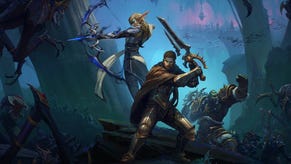Power To The People: The Trouble With Crowd-Sourcing
Crowd Control
Crowd-sourcing. Crowd-funding. The next big thing. A flash-in-the-pan fad. Call it whatever you want, but right now, the gaming industry's fallen in love with the idea of putting its fate in the hands of heaping piles of people. Double Fine Adventure was - so clearly that you could see it from space - the point where everyone took notice. Shockingly, crowds did, in fact, exist before that moment, but DFA caused them to really, truly become a thing in the industry's eyes. Last week, however, saw Phase Two of that movement kick off with things like Penny Arcade's Kickstarter, World of Warcraft's Guild Mentoring Program, Steam Badges, and Steam Greenlight. Problem is, with the exception of the latter, we're sort of doing a really miserable job of leveraging communities, you know, well.
Let's start with Penny Arcade, since it's the most immediately egregious. The basis of the idea - at least, as it's been stated - isn't actually the affront to human decency that many people are making it out to be. Jerry Holkins and Mike Krahulik want to remove ads from the picture (or short series of pictures attached to funny words, as it were) and let fans dictate some of the content they produce. Great. Cool. Even in an ideal world, I'm not sure if it's a model that could work for anything not called Penny Arcade, but it's interesting to see a gaming industry titan attempting to join a club formerly plastered with signs that read "Struggling Indies Only." I mean, imagine if, say, EA felt confident enough in something like this to give us a real Ultima sequel. Or Lucas might finally dust off X-Wing. Or, gosh, we could get more Freedom Force or No One Lives Forever somehow maybe please.
The backlash to Penny Arcade's first lumbering steps, however, has been positively torrential, and there's a very good reason for that: Penny Arcade has presented all of this in such a profoundly arrogant, irresponsible manner that it's set off a sequential chain of knee-jerk reactions powerful enough to register as a seismic event. $300 gets me the privilege of entertaining Jerry and Mike on Twitter for a year? Oh man, which reward tier lets me pen a religious-zeal-tastic Holy Book in their names and not get sued for it? Other tiers offer similarly egocentric rewards that feel more obligatory than genuinely thankful.
The unavoidable impression, then, is one of the Big, Bad Mega-Company clumsily blundering into an institution the infinitely lovable Little Guy built up. It's as though Penny Arcade didn't give the idea that it could set a precedent even a second of thought. With this amount of backlash flying, though, I can guarantee that other major companies - whether developers, publishers, or simply a part of gaming culture - will certainly have many seconds of second thought about doing it at all. And, worst case scenario, some of them may see the end - in this case, success and some pretty serious funding - before the means and come to the conclusion that they don't need to respect their communities either. No matter how you slice it, this is not a good precedent in the slightest.
Meanwhile, two other major companies, Blizzard and Valve, both attempted to rally their communities toward non-monetarily-focused causes and - once again - backed solid ideas with bewilderingly weak executions. In both cases, the end goal was to foster better community involvement - specifically, encouraging experienced players to help newbies in WoW and getting Steam users to be more active via profile comments, game recommendations, etc.
Taken on individual bases, those are great goals to pursue. If we could somehow find a way to make helping our fellow players feel more welcome and capable tangibly beneficial to our own experiences, that'd be amazing. I mean, which would you prefer: a mountain of tutorials that don't really teach you anything or a knowledgeable player patiently showing you the ropes?
Unfortunately, WoW's currently offering such fantastic incentives as MVP status on a forum and "recognition for your guild as being participants in the program." Valve, meanwhile, is handing out badges, which are basically achievements by another name and smell just as weak. As with the Penny Arcade situation, we're seeing a lapse in understanding of how to really engage people in the activities they're performing. Make it interesting, make it fun. Barring any horrible blunt force trauma to the head, I already know I did something. So why is my only reward you telling me that I did it? Why not integrate these things into games or services with care? Why not give us a reason to be better people instead of lackadaisically pretending in pursuit of some title we barely even care about?
Communities are tremendously powerful things, and gaming communities especially overflow with passion that often verges on terrifying. There's no doubt that we have a sleeping giant on our hands, but it seems like the majority of efforts to wake it have been poorly planned, badly thought-out, and generally slapdash. That said, I'm still crossing my fingers that we'll sort these things out with time. I mean, Steam Greenlight's an incredibly promising means of getting communities involved behind-the-scenes, and Valve's also said some encouraging things about how it hopes to incentivize players teaching other players in extremely nuanced games like DOTA 2. These are examples of careful study and foresight, too - instead of simply applying what already works to an entirely new situation.
Overall, though, the industry's off to quite a slow start, and I desperately hope it picks up the pace soon. This could be the beginning of a new movement in games - a destruction of the wall between both player and creator and player and other players. There's potential here for everyone to simply communicate and benefit from each other without crossing telephone lines or being cut off by some third-party that's not really in touch with either side of the conversation. But it's going to take work and - perhaps more importantly - boatloads of new ideas that might just fail.
At the end of the day, though, it all goes back to people. Even if you're dealing with millions of them at once, figure out what makes them tick and respect them as individuals. With that as a starting point - whether developer, publisher, or gamer - I think we'll all end up in pretty good shape in the long run.










